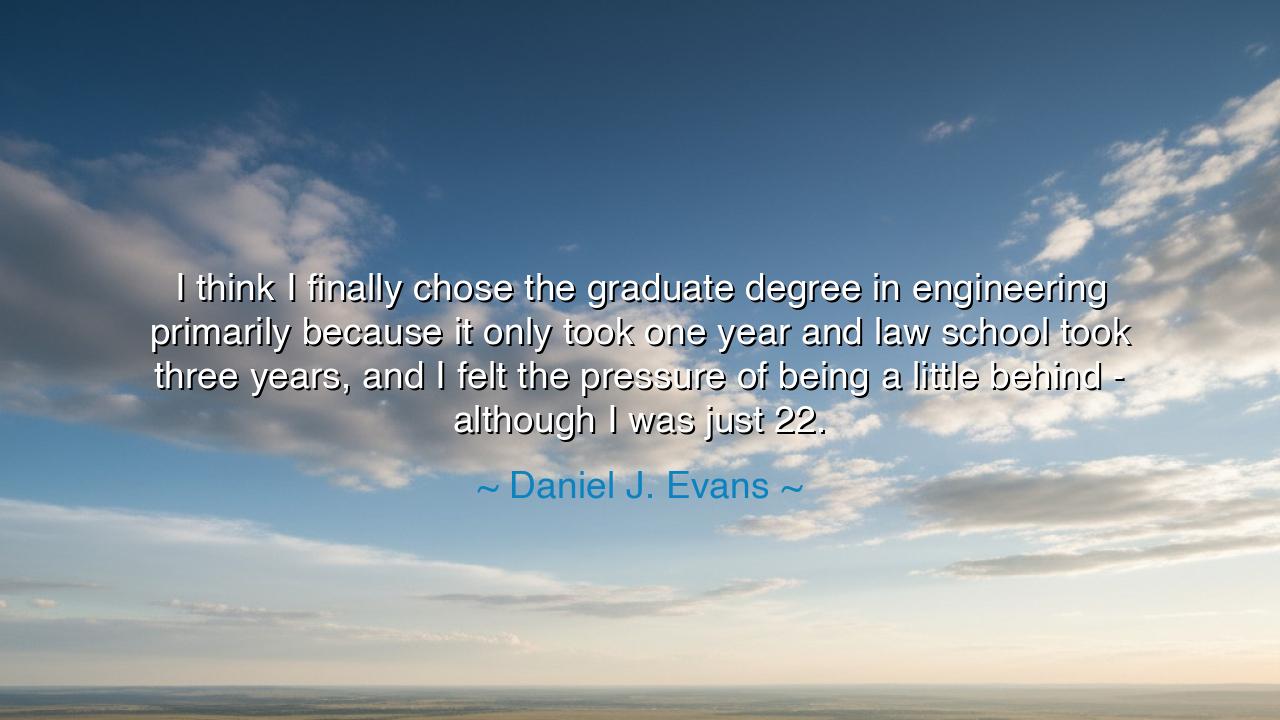
I think I finally chose the graduate degree in engineering
I think I finally chose the graduate degree in engineering primarily because it only took one year and law school took three years, and I felt the pressure of being a little behind - although I was just 22.






The words of Daniel J. Evans — “I think I finally chose the graduate degree in engineering primarily because it only took one year and law school took three years, and I felt the pressure of being a little behind — although I was just 22.” — appear humble and almost humorous at first glance, yet within them lies a quiet mirror reflecting the condition of the human heart: that restless urgency to move forward, that subtle weight of time pressing upon the young, even when the journey has only just begun. It is the confession of a man who, looking back, recognizes the illusion of haste that so often governs our early years — the feeling that life is slipping through our fingers before it has truly begun.
Daniel J. Evans, who would go on to become a respected engineer, governor, and senator, spoke these words from the vantage of experience. As a young man, standing at the threshold of adulthood, he faced the same crossroads that confront many: whether to pursue passion, prestige, or practicality. His decision — to study engineering instead of law — was guided not by destiny’s thunderous voice, but by the quiet hum of pragmatism and impatience. He chose the shorter path, believing time was already his adversary. Yet beneath his self-deprecating tone lies a profound truth: that even the wrong reasons can lead us to the right journey, if we walk them with integrity and purpose.
To be 22 years old and to feel “a little behind” is the burden of youth across all generations. In the ancient world, young warriors and scholars alike were haunted by the same urgency. Alexander the Great, by that same age, had already begun his conquests, driven by the conviction that his star must burn before others. And yet, for all his glory, his empire was brief — his flame too bright, too swift. Evans’ words, though spoken in modern times, carry the same echo: that the race against time is often a race against illusion. We chase the horizon, fearing delay, when in truth, time is not our enemy but our companion — waiting patiently for us to learn how to walk in step with it.
There is humility, too, in Evans’ reflection — the humility of a man who recognizes how pressure can cloud perspective. He admits that his choice was not born of deep calling, but of fear: the fear of lagging behind, of being late to the invisible finish line society sets for us. Yet from that choice sprang a life of service and achievement, proof that even paths chosen from anxiety can lead toward purpose when the traveler brings integrity to his steps. The engineering degree he chose out of haste became a foundation for a career built on building — not only structures, but systems of governance, education, and civic reform. His life became an argument for the ancient truth: that intention may falter, but perseverance redeems.
His words also whisper a deeper wisdom to the generations that follow: that life does not unfold according to the rigid clocks we set for ourselves. To feel “behind” at 22 is to mistake motion for meaning, and speed for success. The ancient stoics — men like Seneca — warned that we waste our lives not because time is short, but because we misuse it. Evans’ reflection is an echo of that counsel. The pressure of youth — that urgency to achieve quickly, to arrive early — blinds us to the richness of becoming. The journey itself, not its efficiency, is what shapes character and wisdom.
Consider the example of Albert Einstein, who, after graduating, struggled to find employment and was dismissed as a failure by his peers. He worked as a patent clerk — an obscure, unglamorous position — while others raced ahead into academia. Yet it was in that quiet period of seeming delay that he developed the ideas that would transform the understanding of the universe. His story, like Evans’, reveals that being “behind” is often the soil from which greatness grows. Delay is not defeat; it is incubation.
So let this be the teaching, O seeker: do not measure your life by the pace of others. The pressure to be swift is a temptation, but wisdom moves at its own rhythm. Choose paths not because they are short, but because they are true to your heart. If haste drives you, let purpose steady you. If fear guides your step, let courage refine it. Remember that even decisions made in uncertainty can bear fruit if nurtured with diligence, humility, and hope.
For in the end, Daniel J. Evans’ reflection is not one of regret, but of understanding. He learned, as all wise men do, that youth’s obsession with speed fades before life’s deeper lesson: that the measure of a life is not how quickly one begins, but how steadfastly one continues. Time is not a race to be won — it is a road to be walked with grace. So walk your path, however long or short, with patience. Trust that each step, even when chosen in haste, can lead you toward the horizon of your true becoming — if only you walk it with heart.






AAdministratorAdministrator
Welcome, honored guests. Please leave a comment, we will respond soon